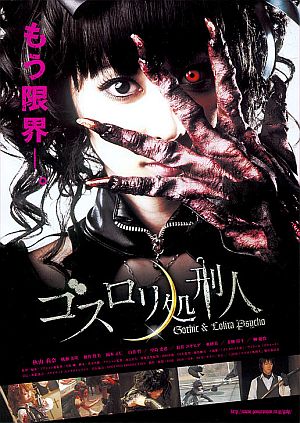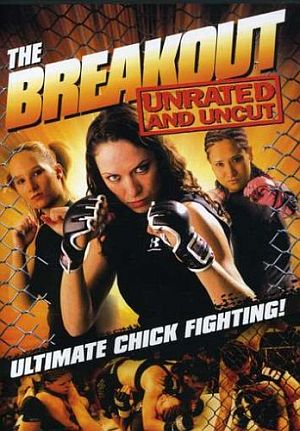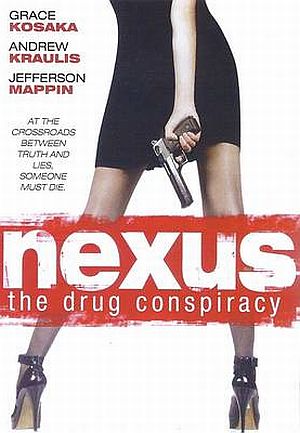★★
“Do we really need a ghetto, microbudget version of Charlie’s Angels? But then, did we really need the TV reboot?”
 In many ways, this is wretched beyond belief, crippled by near non-existent production values and likely only to appeal to those who live in the urban culture depicted. And yet… For every moment of wince-inducing idiocy [Agustin appears to be a big fan of Benny Hill, using speeded-up footage for “humourous” effect more than once], there were moments of surreal charm. For instance, “Captions for the Hispanic-impaired,” or the really terrible fight scene which breaks the fourth wall, turning into a “making of” segment which (and I can attest to this) accurately depicts the hell of being a microbudget moviemaker. Or that the large family of children belonging to one of the Angels includes a bearded midget. “He just showed up one day. Hey, he buys groceries, it’s cool” is her casual explanation.
In many ways, this is wretched beyond belief, crippled by near non-existent production values and likely only to appeal to those who live in the urban culture depicted. And yet… For every moment of wince-inducing idiocy [Agustin appears to be a big fan of Benny Hill, using speeded-up footage for “humourous” effect more than once], there were moments of surreal charm. For instance, “Captions for the Hispanic-impaired,” or the really terrible fight scene which breaks the fourth wall, turning into a “making of” segment which (and I can attest to this) accurately depicts the hell of being a microbudget moviemaker. Or that the large family of children belonging to one of the Angels includes a bearded midget. “He just showed up one day. Hey, he buys groceries, it’s cool” is her casual explanation.
As you’d expect, it’s a spoof, with the three leading ladies living in Harlem, and as in the original, getting their orders from Charlie by phone – except, here, that’s because he’s locked up in jail. While sent undercover at a strip-club, supposedly to track down some white girl whose sleeping with a local guy, they overhear their landlord Big Lou (Reynosa) getting a loan from the Mafia guy who owns the club. He promises to pay the loan back by fixing the “boleta,” the local numbers game. They’re not going to tolerate this attack on an integral part of their culture, so have to stop him and his associate, Triple Gauge, before they can bring this heinous plot to completion.
Credit the three leads for giving their all, attacking their characters with a great deal of energy, that helps overcome some of the obvious limitations. I’m pretty sure a lot of cultural references went whizzing way above my head, but as the kids say, I’m “down” enough [Phoenix is pretty Hispanic] to be able to get a good chunk. The plot is pretty awful, the action falls short of even the 1970’s original version, and there’s way too much yapping, of a style generally seen on afternoon talk-shows. But there’s a sense the people involved have genuine enthusiasm, and made it for the love of film-making. At barely an hour between (rather nifty) comic-book styled opening credits and (entirely unfunny) bloopers which close things out, it can hardly be accused of overstaying its welcome. I probably enjoyed it more than the grade above suggests, but I own the very substantial tolerance for poverty-row productions required; your reaction will likely depend on that.
Dir: Agustin
Star: Evly Pacheco, Alessandra Ramos, Jeni Garcia, Raymond Reynosa






 This was the title that finally ‘broke’ Chris, and she wondered what the hell I was Googling to come across this movie. Shame she missed it, as despite some rather nasty sexual sadism, it’s among the best of the genre. Girl gang leader Noriko (Sugimoto) is assigned to the “School of Hope”, a morally-bankrupt educational establishment for delinquent girls. It’s principal is entirely ineffectual, and it’s actually run by the vice-principal (Imai), with the collaboration of the “Disciplinary Committee,” a group of the girls he allows to dish out punishment. Noriko isn’t going to stand for that, and teams up with a sleazy journalist (Watase) to bring down both the Committee and those in charge.
This was the title that finally ‘broke’ Chris, and she wondered what the hell I was Googling to come across this movie. Shame she missed it, as despite some rather nasty sexual sadism, it’s among the best of the genre. Girl gang leader Noriko (Sugimoto) is assigned to the “School of Hope”, a morally-bankrupt educational establishment for delinquent girls. It’s principal is entirely ineffectual, and it’s actually run by the vice-principal (Imai), with the collaboration of the “Disciplinary Committee,” a group of the girls he allows to dish out punishment. Noriko isn’t going to stand for that, and teams up with a sleazy journalist (Watase) to bring down both the Committee and those in charge. With a bit more of an intricate plot than most entries, this is the tale of revenge served cold. The Oba Yakuza gang shoot one of their flunkies up with drugs and dump his dead body in a ditch. His daughter, Maki (Ike), tries to stab the boss responsible (Hayama) in a nightclub, but she is, frankly, a bit crap with a blade; the attack fails, and she ends up in prison. There, after proving her toughness in a jail “I quit” match, she is accepted by the other girls, including the heavily-tattooed Masayo (Sugimoto). A few years pass, and Maki gets out of jail; her friends are waiting, and they agree to help in her plan for vengeance. This involves Tetsu, the psycho scion of the Hamayasu clan, who used to rule things before the Oba group came in and kicked their asses. Maki will use him as the scapegoat, to trigger war between the groups, then step in to take out Oba once he has been weakened. That’s the plan, anyway, with Maki whoring herself out, to (gasp!) foreigners and even (shock!) a black airman to get resources. However, a large spanner in the works is that Masayo is also Oba’s wife…
With a bit more of an intricate plot than most entries, this is the tale of revenge served cold. The Oba Yakuza gang shoot one of their flunkies up with drugs and dump his dead body in a ditch. His daughter, Maki (Ike), tries to stab the boss responsible (Hayama) in a nightclub, but she is, frankly, a bit crap with a blade; the attack fails, and she ends up in prison. There, after proving her toughness in a jail “I quit” match, she is accepted by the other girls, including the heavily-tattooed Masayo (Sugimoto). A few years pass, and Maki gets out of jail; her friends are waiting, and they agree to help in her plan for vengeance. This involves Tetsu, the psycho scion of the Hamayasu clan, who used to rule things before the Oba group came in and kicked their asses. Maki will use him as the scapegoat, to trigger war between the groups, then step in to take out Oba once he has been weakened. That’s the plan, anyway, with Maki whoring herself out, to (gasp!) foreigners and even (shock!) a black airman to get resources. However, a large spanner in the works is that Masayo is also Oba’s wife… After my disappointing first foray, this is more like it, right from the moment Sachiko (Sugimoto) rips open her top, revealing a heavily-tattooed breast, before she and her Red Helmet Gang of biker chicks kick the asses of another, male gang who are hassling them. It’s clear that Sachiko deserves the title far more that the ‘Delinquent Girl Boss’. She and her crew from Tokyo head off to Kyoto, where they face off against, and end up taking control of, the local girl gang – some of whom are none to happy by this invasion [Kyoto being the former capital, its residents seems to hold a grudge against those from Tokyo]. Sachiko ends up on the wrong side of the local Yakuza, one of whom has a sister, Nami (Ike), who is an independent free-agent girl gangster, affiliated with none, but kinda over-seeing all. Sachiko meets and falls for a boxer, Ichiro (Mizushimi), after he helps her girls out of a tough spot with the Yakuza, and follows him to a seaside resort where he is training. Needless to say, love does
After my disappointing first foray, this is more like it, right from the moment Sachiko (Sugimoto) rips open her top, revealing a heavily-tattooed breast, before she and her Red Helmet Gang of biker chicks kick the asses of another, male gang who are hassling them. It’s clear that Sachiko deserves the title far more that the ‘Delinquent Girl Boss’. She and her crew from Tokyo head off to Kyoto, where they face off against, and end up taking control of, the local girl gang – some of whom are none to happy by this invasion [Kyoto being the former capital, its residents seems to hold a grudge against those from Tokyo]. Sachiko ends up on the wrong side of the local Yakuza, one of whom has a sister, Nami (Ike), who is an independent free-agent girl gangster, affiliated with none, but kinda over-seeing all. Sachiko meets and falls for a boxer, Ichiro (Mizushimi), after he helps her girls out of a tough spot with the Yakuza, and follows him to a seaside resort where he is training. Needless to say, love does  When Rika (Oshida) gets out of reform school, she goes to visit her friend Midori (Katayama), and gets a job working in the garage belonging to Midori’s father Muraki (Ban), even though Midori is estranged from him – except when she needs money to pay off her boyfriend’s gambling debts to the local Yakuza under Boss Ohya (Nobuo Kaneko). Another friend of Rika’s is working in an “art studio”, doing nude modelling to support her sick husband, and still others are hostesses at the Ginza Girls cabaret, a dance-hall which Ohya’s gang are also extorting for protection money. After Muraki has to take a loan using the garage as collateral to pay Ohya, Rika tries to offer herself as an alternative to the boss. This goes about as well as you’d expect, though there’s a genuinely cool twist in which we find someone isn’t quite who we seem. There’s a tragic fatality, which sets the scene for all the girls to get together and take on Ohya’s gang.
When Rika (Oshida) gets out of reform school, she goes to visit her friend Midori (Katayama), and gets a job working in the garage belonging to Midori’s father Muraki (Ban), even though Midori is estranged from him – except when she needs money to pay off her boyfriend’s gambling debts to the local Yakuza under Boss Ohya (Nobuo Kaneko). Another friend of Rika’s is working in an “art studio”, doing nude modelling to support her sick husband, and still others are hostesses at the Ginza Girls cabaret, a dance-hall which Ohya’s gang are also extorting for protection money. After Muraki has to take a loan using the garage as collateral to pay Ohya, Rika tries to offer herself as an alternative to the boss. This goes about as well as you’d expect, though there’s a genuinely cool twist in which we find someone isn’t quite who we seem. There’s a tragic fatality, which sets the scene for all the girls to get together and take on Ohya’s gang. After the abomination that was Part 2, I’d filed the third entry under ‘watch whenever I have time’, until a spirited debate on its merits (or otherwise) broke out on over oun our
After the abomination that was Part 2, I’d filed the third entry under ‘watch whenever I have time’, until a spirited debate on its merits (or otherwise) broke out on over oun our  Misaki (Hoshino) is in prison for stabbing a policeman to death, but is taken from her jail to a remote island. There, she joins the rest of the hand-picked prisoners, who are there to be trained by a mysterious government organization, and moulded into operatives who can be used to protect national security. Most of the inmates just want to make things easy, sleeping with the guards in exchange for privileges, but Misaki is made of tougher stuff, and won’t buckle down to the authorities. While she begins plotting how to escape the island, she needs to overcome a number of problems, not least having no idea about where it is, and whether the small boat they stumble across will be capable of getting them to any other land.
Misaki (Hoshino) is in prison for stabbing a policeman to death, but is taken from her jail to a remote island. There, she joins the rest of the hand-picked prisoners, who are there to be trained by a mysterious government organization, and moulded into operatives who can be used to protect national security. Most of the inmates just want to make things easy, sleeping with the guards in exchange for privileges, but Misaki is made of tougher stuff, and won’t buckle down to the authorities. While she begins plotting how to escape the island, she needs to overcome a number of problems, not least having no idea about where it is, and whether the small boat they stumble across will be capable of getting them to any other land. First of all, “Gothic Lolita” is a Japanese style term; Lolita fashion is based on clothing from the Victorian era, and the Gothic sub-genre is…well, suitable for a Victorian funeral, basically. Quite why heroine Yuki (Akiyama) decides to dress like this, after her mother is murdered by a group of five thugs, is never satisfactorily explained. Actually, it’s never even mentioned, putting it alongside the issue of why her father (Yanagi) is apparently a Christian priest, now confined to a wheelchair as a result of the attack. Or where Yuki is now a skilled fighter, armed with a bulletproof, lethal umbrella that can kill you in a variety of ways. Where does she get those wonderful toys, to borrow a phrase.
First of all, “Gothic Lolita” is a Japanese style term; Lolita fashion is based on clothing from the Victorian era, and the Gothic sub-genre is…well, suitable for a Victorian funeral, basically. Quite why heroine Yuki (Akiyama) decides to dress like this, after her mother is murdered by a group of five thugs, is never satisfactorily explained. Actually, it’s never even mentioned, putting it alongside the issue of why her father (Yanagi) is apparently a Christian priest, now confined to a wheelchair as a result of the attack. Or where Yuki is now a skilled fighter, armed with a bulletproof, lethal umbrella that can kill you in a variety of ways. Where does she get those wonderful toys, to borrow a phrase. S’funny what you stumble across on Netflix, at the end of a long chain of “See also…” recommendations came this, which according to the
S’funny what you stumble across on Netflix, at the end of a long chain of “See also…” recommendations came this, which according to the  The shortest match of the night – lasting exactly one minute – was a bit unfortunate, as Shayna Baszler actually broke the arm of her opponent, Samantha Anderson. She was applying a submission hold on the arm, but it seemed that Baszler fell forward, resulting in the pressure being made much worse, and resulting in a clean break of her humerus. Ouch. The opening contest [on the DVD – there was an amateur fight not included for some reason] was the only one that lasted longer than one five minute round, with Marissa Inhofer beating Kirsty Bushnell. As well as being the brother of another MMA figher [Nick Inhofer was on The Ultimate Fighter 3] Inhofer was a roller-derby girl, and seemed to have brought a large contingent of her team-mates with her.
The shortest match of the night – lasting exactly one minute – was a bit unfortunate, as Shayna Baszler actually broke the arm of her opponent, Samantha Anderson. She was applying a submission hold on the arm, but it seemed that Baszler fell forward, resulting in the pressure being made much worse, and resulting in a clean break of her humerus. Ouch. The opening contest [on the DVD – there was an amateur fight not included for some reason] was the only one that lasted longer than one five minute round, with Marissa Inhofer beating Kirsty Bushnell. As well as being the brother of another MMA figher [Nick Inhofer was on The Ultimate Fighter 3] Inhofer was a roller-derby girl, and seemed to have brought a large contingent of her team-mates with her. If you’re going to use a cover like this, you’d better live up to it, even if we can forgive the heels as artistic license. And while not a complete lie, this takes far too long to deliver, and comes up short of expectations. Holly (Kosaka) is a nightclub singer, separated from her husband, who got custody of their daughter due to a DUI Holly got, with the daughter in the car. On arrival at his house to pick up their child for a scheduled visit, she finds him missing – and a gun in the basement, along with a case of drugs. She calls the police, but ends up getting arrested after the police find her husband’s body, and her fingers on the murder weapon, which has mysteriously moved from the basement to the scene of the crime. The drugs have also vanished; while held in jail over the weekend, Holly gets a visit from their owner, who busts her out and insists she return with him and his thugs to the house to show her where they are. Can she escape their grasp, rescue her daughter and find out who the real murderer was?
If you’re going to use a cover like this, you’d better live up to it, even if we can forgive the heels as artistic license. And while not a complete lie, this takes far too long to deliver, and comes up short of expectations. Holly (Kosaka) is a nightclub singer, separated from her husband, who got custody of their daughter due to a DUI Holly got, with the daughter in the car. On arrival at his house to pick up their child for a scheduled visit, she finds him missing – and a gun in the basement, along with a case of drugs. She calls the police, but ends up getting arrested after the police find her husband’s body, and her fingers on the murder weapon, which has mysteriously moved from the basement to the scene of the crime. The drugs have also vanished; while held in jail over the weekend, Holly gets a visit from their owner, who busts her out and insists she return with him and his thugs to the house to show her where they are. Can she escape their grasp, rescue her daughter and find out who the real murderer was?